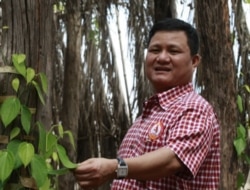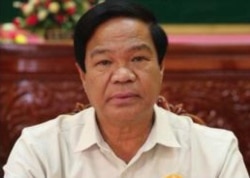The Cambodian government on Tuesday called the announcement of U.S. Treasury sanctions against General Kun Kim and logging tycoon Try Pheap “groundless” and based on “accusations.”
The sanctions, imposed under a 2012 law known as the Magnitsky Act, block any property or interest in property within U.S. jurisdiction held by targeted individuals. Kun Kim and Try Pheap are close associates of Prime Minister Hun Sen, with the sanctions including family members and companies linked to them, and based on the accusation of corruption.
The Cambodian Ministry of Foreign Affairs on Tuesday called the designation of the two individuals under the Magnitsky Act as “arbitrary,” and defended Kun Kim and Try Pheap.
The ministry’s statement said Kun Kim was “well known for his great contribution to the protection and maintenance of peace, stability and social order.” Additionally, it said that Try Pheap had “played an active role in supporting Cambodia’s socio-economic development.”
The Foreign Ministry statement asserts the sanctions are an act of interference in Cambodia internal affairs and in violation of international laws, including the principles of the United Nations.
The U.S. Treasury Department statement points to Kun Kim’s influence as a senior general in the Royal Cambodian Armed Forces (RCAF) and a personal relationship with China, which he used to gain benefit from development projects in Koh Kong province.
“Kun Kim was replaced as RCAF Chief of Staff because Kim had not shared profits from his unlawful businesses with senior Cambodian government officials,” the statement reads.
Apart from Kun Kim, three individuals from his family, King Chandy, Kim Sophary and Kim Phara, along with five firms linked to the family were also sanctioned.
For Try Pheap, the statement pointed to his “large scale illegal logging consortium” showed that he was involved in corruption, including the misappropriation of state funds, bribery and the use of influence in the government for the extraction of natural resources.
Eleven companies owned or controlled by Try Pheap were also part of the sanctions.
Kun Kim, or three of his family members, and Try Pheap could not be reached for comment on Tuesday.
Kim Rithy, Kun Kim’s son and deputy governor of Kandal province, answered the phone on Tuesday but disconnected after being asked for a reaction to the development. He did later take to Facebook to defend his father and siblings, Kim Phara and Kim Sophary.
“My siblings conduct honest and legitimate businesses with full compliance to Cambodian laws,” Kim Rithy posted on Facebook. “Our family holds utmost respect to our beloved nations and our fellow citizens.”
Last year, General Hing Bun Heang, commander of Hun Sen's Bodyguard Unit, was also sanctioned under the Magnitsky Act, for his alleged role in a 1997 grenade attack targeting opposition leader Sam Rainsy, which killed some 16 people and injured more than 100 including an American citizen.
Hun Vannak, 37, an environmental campaigner with the Mother Nature movement, said past events indicated that Kun Kim was linked with Union Development Group in Koh Kong province, where the Chinese conglomerate is building a massive 45,000-hectare tourism development project.
Concerns have been raised by the United States that the infrastructure at the site could potentially be used to facilitate a Chinese naval base in the future. The Cambodian government has denied these concerns.
“People have protested [against UDG], the media then started reporting about it and Kun Kim appeared to facilitate [a resolution],” Hun Vannak said. “So, villagers hypothesized that there is cooperation between the company and Kun Kim.”
The sanctions come amid a separate investigation by the European Union over rights concerns in Cambodia, which could result in the suspension of the “Everything But Arms” trade preferences.
The United States House of Representatives has passed legislation that could sanction senior members of the government for the 2017 crackdown on the political opposition, civil society and independent media organizations. The draft legislation currently is in the U.S. Senate for review.
Human rights watchdog Global Witness called on other governments to impose sanctions against Kun Kim and Try Pheap, who, the NGO said, had been found to have routinely benefited from their close ties to Hun Sen and enjoyed absolute impunity.
“As Hun Sen’s supporters have accumulated more and more wealth and impunity, their incentive to help him cling to power has increased,” said Global Witness Director Patrick Alley.
“Accountability for those sustaining the corrupt dictatorship that is oppressing Cambodians on a daily basis is long overdue.”










